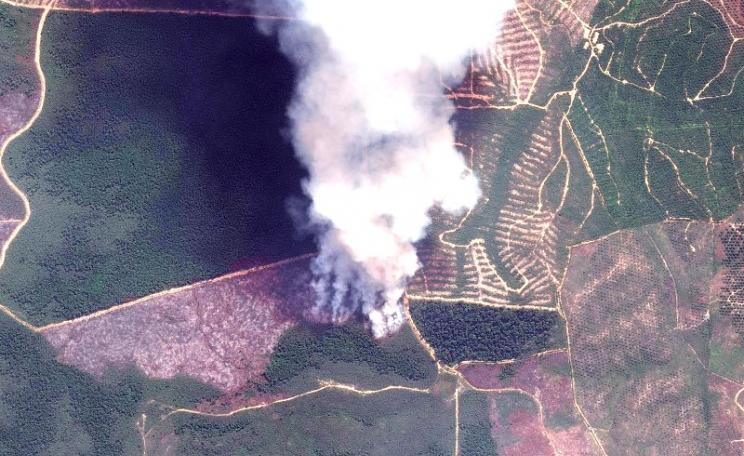*
Migration in the context of climate change is a justice issue. Those countries that have contributed most to climate change have a responsible the vulnerable communities forced to migrate due to climate change.
Climate justice is a matter of determining the rights of those communities and the responsibilities of high polluters toward them.
However, public discourses on climate change induced migration are moving backwards in terms of posing the question of justice, when they should be asking: how come certain people and communities are more vulnerable to climate change impacts; don't high polluters owe redress to these groups?
Climate injustice
Wildfires in California have been exacerbated by climate change, and have destroyed hundreds of homes and displaced thousands of people. Huge numbers of homeless are sleeping on the streets.
At the other end of the scale, a recent report rom the UK Committee on Climate Change found that accelerating rising sea levels would claim coastal areas in the country and local communities would have to move inland.
These two cases are indicative of human mobility in the context of climate change, an issue that has for long been troubling people and communities in the global South.
Cross-border mobility is an immediate effect of rising seas in the Pacific island nations. The fact is that those most vulnerable in terms of socio-economic status will be most affected no matter which country they live in.
A distinction is usually made between internally climate-displaced people and those crossing borders, but the lines between them may be blurred in practice: although most displaced people remain within their own country, some of them cross borders to reach safety in another country.
Just recently, the former US Secretary of State John Kerry spoke at a Guardian event and warned Europe of migration chaos if immediate actions are not taken to effectively address climate change. Muslim and African migrant populations are racialized within these climate security discourses as prone to terrorism or radicalization. This may contribute to policy developments that are detrimental to people's ability to relocate.
Failure to act
International policy tools also come up short with regards to climate change induced migration.
The UN’s Warsaw International Mechanism for Loss and Damage associated with Climate Change Impacts was established in 2013 to address - amongst others - migration in the context of a changing climate.
However, it lacks a coordinated framework for addressing the multiple challenges of mobility due to climate change, including the implications for the human rights of the residents and different types of movements, as impact scenarios vary substantially by geographic location.
The UN's recent, non-binding Global Compact for Safe, Orderly and Regular Migration refers to climate change induced migration but does not provide specific protection to climate displaced people. Moreover, traditionally migrants' host countries like the US and Australia have withdrawn from the adoption process.
In the absence of government action to address climate change induced human mobility, non-governmental organizations (NGOs) can play important roles, both raising awareness of climate change induced migration and advocating for policy reforms on this issue.
Security threats
With a few notable exceptions, most environmental and humanitarian NGOs have encouraged actions to address displacement in the context of climate change through an ethos of individual responsibility or political action, but have promoted those changes in minor ways rather than establishing dedicated campaigns on the issue.
The media holds a central position in framing issues surrounding the integration of migrating people into local communities. However, the media is using strategies of dehumanization.
People migrating in the context of climate change are understood and communicated by news media as victims or security threats, highlighting their otherness and distance from mainstream audiences.
Moreover, displaced people are being spoken about and for but not with, they are not part of the conversation. The voices of people most impacted by climate change are rarely heard in mass media. This means that potentially little of the real situation of climate change effects on local populations is reported.
We need to pay attention not only to what a news story is about but also how this story is told. How can we create a frame that both supports the story and defines climate change induced migration in a fair and balanced way.
Tailored messages
A climate justice narrative is needed to communicate and enhance public understanding of climate change induced migration. Key components of this narrative must be human rights protection, greater equity in burdens sharing, and participation in decision-making processes. This will also help to break anti-migrant sentiments and xenophobia.
A recent study in the UK suggests that the ‘climate justice’ narrative polarises audiences along political lines. In particular, the researchers asserted that a climate justice frame does not resonate well with the center-right.
However, climate injustice was introduced in the research in an abstract way, as a distant issue with no actual impact on the lives of the UK audience (for example, that could have been a storyline about poor people in coastal areas in the UK suffering most by climate change), contrary to the proximity that characterised other narratives tested in the research e.g. the advantages of ‘Great British Energy’ and ‘avoiding waste’.
Tailored climate justice messages that provide a direct connection of the social aspects of climate change with people’s interests may have the power to reduce skepticism amongst them.
Intergenerational duty
There is evidence that people are significantly concerned about the ethical implications of leaving future generations with the burdens of climate change impacts. Intergenerational duty, expressed by preserving the environment for future generations, is a climate justice demand.
Activists such as the Pacific Climate Warriors are defending rights to homeland and culture for future generations.
In particular, Pacific islanders would prefer the media to represent them as active ‘change agents’ developing climate change response strategies including ‘migration with dignity.’
Such an approach is essential at a time when hostile attitudes towards migrants and refugees, in general, are prevalent within policy and media circuits.
This Author
Maria Sakellari is a Marie Sklodowska-Curie Fellow at the University of Brighton. Her project IKETIS has received funding under the EU’s Horizon 2020 research and innovation programme (Grant agreement No 74829).






